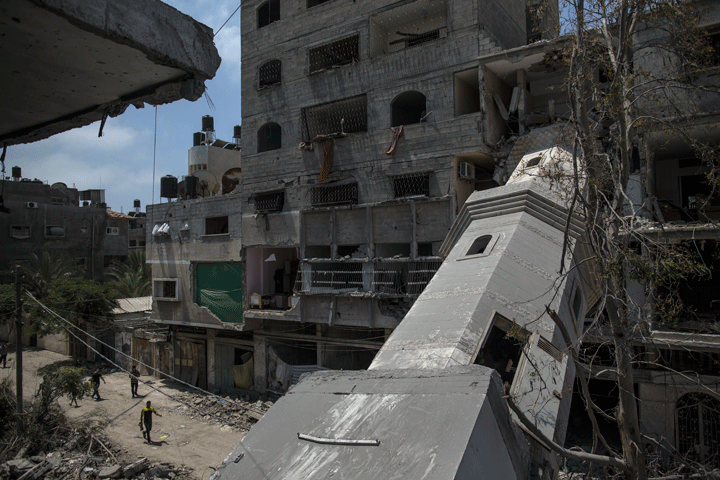BRUSSELS, Belgium – The European Union offered Friday to take charge of Gaza’s border crossings and work to prevent illegal arms flows, insisting on a durable truce and saying a return to the status quo before the latest war “is not an option.”

As EU foreign ministers held an urgent meeting in Brussels about global conflicts, Hamas negotiators met with the Islamic militant group’s leadership in Qatar to discuss a proposal for a long-term truce with Israel. An official said the group was inclined to accept the Egyptian-mediated offer.
The Gaza blockade remains the main stumbling block. It has greatly limited the movement of Palestinians in and out of the territory of 1.8 million people, restricted the flow of goods into Gaza and blocked virtually all exports.
READ MORE: Ottawa urged to let injured kids from Gaza travel to Ontario hospitals
The EU is prepared “to play a strong role” in managing the crossings while assuring that Israel’s security is guaranteed, said the 28-nation bloc’s foreign policy chief, Catherine Ashton.
The EU offered to reactivate and extend its monitoring of the Rafah crossing with Egypt and other border posts, provided there will be a UN Security Council mandate for the mission and a sustainable cease-fire in place. In addition, the EU says Israel must lift its blockade to allow “a fundamental improvement in the living conditions for the Palestinian people in Gaza.”
The EU foreign ministers said the bloc is also prepared to prevent arms smuggling and launch a training program for Palestinian Authority police and customs officers to be deployed in Gaza.
“The situation in the Gaza Strip has been unsustainable for many years and a return to the status quo prior to the latest conflict is not an option,” they said.
Israel and Hamas are observing a five-day temporary cease-fire in an attempt to allow indirect talks in Cairo to continue. The negotiations are meant to secure a substantive end to the monthlong Gaza war and draw up a roadmap for the coastal territory, which has been hard-hit in the fighting.
Hamas is demanding the lifting of the blockade Israel and Egypt imposed after the militant group seized power in Gaza in 2007.
The proposal is believed to include the lifting of some restrictions, with Western-backed Palestinian President Mahmoud Abbas’ forces assuming responsibility for border crossings under new arrangements with Egypt.
READ MORE: Montrealers demonstrate to show support for Palestine
Israeli officials have said little about the negotiations, saying only that the country’s security needs must be met.
Representatives of Palestinian factions in Cairo said progress was being made. A Hamas official said his group had all but accepted the offer and was currently finalizing the wording.
“The proposed agreement states in many places that lifting the blockade will come through measures and mechanisms agreed upon between Israel and the Palestinian Authority, and this means Israel will always have the upper hand,” he said.
That has raised concerns that Israel could re-impose the closures, returning the situation to what it was before the war, he said.
But he also said the emerging deal would end hostilities and answer some immediate Hamas needs, including providing materials for reconstruction. He spoke on condition of anonymity because the negotiations were still ongoing.
Israel says the blockade is necessary to prevent arms smuggling, and officials are reluctant to make any concessions that would allow Hamas to declare victory.
Israel, meanwhile, has demanded that Hamas be disarmed – a non-starter for the militant group – or at the very least be prevented from re-arming.
READ MORE: Brantford woman trying to get 8-year-old daughter out of Gaza
Hamas has recovered from previous rounds of violence with Israel, including a major three-week air and ground operation in January 2009 and another weeklong air offensive in 2012. It still has an arsenal of several thousand rockets, some of which can reach major Israeli cities.
The current cease-fire is the longest to be declared since the war broke out last month. The fighting has so far killed more than 1,900 Palestinians, the majority of them civilians, according to Palestinian and UN officials. Israeli officials say the country has lost 67 people, all but three of them soldiers.
In Europe, leaders insisted Israel and the Palestinians must yield ground to eventually achieve a sustainable two-state solution.
Daraghmeh reported from Cairo. Angela Charlton in Paris contributed reporting.

Comments